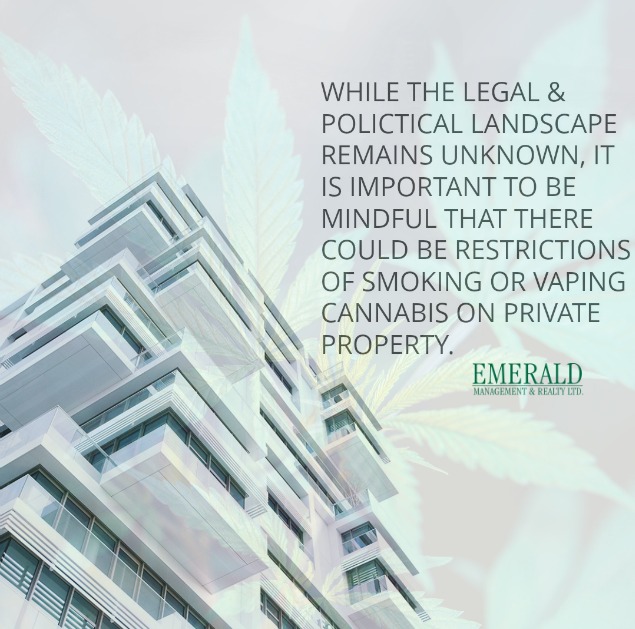Cannabis consumption in multi-family properties
With recreational cannabis now legal across Canada as of October 17, 2018 it is important to understand where it can be consumed.
Effective October 17, 2018, cannabis may be consumed on private property but is prohibited in any form (smoking, vaping or edibles) in public places under the Cannabis Consumption Bylaw. Even people with an exemption for medical reasons will need to comply with the Bylaws being enforced by the City of Calgary: Smoking and Vaping Bylaw; Alberta’s Tobacco and Smoking Reduction Act. Violation of the bylaws could result in a $100 ticket issued by The City of Calgary Police, City of Calgary peace officers and Calgary Transit peace officers.
While the legal and political landscape seems to be ever changing regarding the legalization of cannabis … and much still remains unknown, it’s important to be mindful that there could be restrictions of smoking or vaping cannabis on private property, especially within and around condominium corporations and rental properties.
Using cannabis in rental properties
Lease agreements with Emerald Management & Realty Ltd. contain a non-smoking clause unless residents have been otherwise exempted for medical reasons, etc.
The purpose of the non-smoking clause is to provide safe, secure housing while balancing the needs of all tenants, guests, employees, contractors and property owners. No smoking or vaporizing of any substance, (including but not limited to tobacco products and/or cannabis products, hemp products, or illegal narcotics its extracts and derivatives), will be permitted within the suite, or the common areas of the building (if applicable) by any tenant, occupant, invitee, agent, or licensee.
If tenants reside in a non-smoking building, a medical exemption will not permit smoking or vaping cannabis in the building. Under such circumstances, tenants may need to seek a transfer to a smoking-allowed building.
Using cannabis in condo properties
Some condominium bylaws already prohibit smoking in common areas, along with activities that interfere with the right to peaceful enjoyment, and some straight out forbid cannabis consumption.
With the legalization of cannabis, the same policies and bylaws will be enforced unless otherwise provided for by Federal and Provincial legislation.
Recent changes to the Condominium Property Act make this an opportune time to engage with residents and stakeholders on opportunities to update a condo’s bylaws, policies and house rules.
For condominium corporation’s looking to specifically prohibit the smoking of tobacco, cannabis and related products because of common problems relating to noxious smells and insurance related concerns due to potential mould from growing cannabis, there are a couple of items to keep in mind:
- The board’s proposed changes will need 75% of unit factors in approval of the changes.
- Consideration to human rights legislation and a duty to accommodate should be given.
- Will the owners support a smoke-free policy inclusive of cannabis? In their Unit? On Common Property? What about their Exclusive Use Areas?
- Is growing or cultivation or cannabis plants permitted in a Unit or Exclusive Use Areas?
Condo Corporations are able to make these kinds of changes relating to “use and occupancy” restrictions because of the Condominium Property Act. Until this issue is tested in the legal realm, it looks corporations will be able to address this topic the same way pet restrictions have been enforced.
For more information on creating a smoke-free policy and how to engage with stakeholders, visit: Smoke-Free Housing Alberta
AND … lastly (but most importantly) make sure to get informed advice from a lawyer that specializes in condominium corporations. The minor cost to make sure your amendment is drafted properly and on point with current practices and legislation is better than the cost of future legal pains.
« Return to Blog

